Workplace Law: Contract of Employment and Sham Contracting Analysis
VerifiedAdded on 2023/06/15
|9
|2012
|77
Case Study
AI Summary
This case study examines a workplace law scenario involving Athena, a migrant worker, and Chinatown Restaurant (CR). The analysis focuses on whether Athena was a valid party to an employment contract, her employment status after resignation, and potential breaches of the Fair Work Act 2009 (Cth) related to sham contracting. The study applies common law tests like the control test, integration test, and multifactor test to determine Athena's status as an employee or independent contractor. It concludes that Athena was an employee of CR and that CR potentially violated the Fair Work Act by misrepresenting her employment status through a sham contracting arrangement with Restaurant Services Pty Ltd (RS). The analysis references relevant case law and legislation to support its findings.

Word Count: 1613
Paraphrase This Document
Need a fresh take? Get an instant paraphrase of this document with our AI Paraphraser
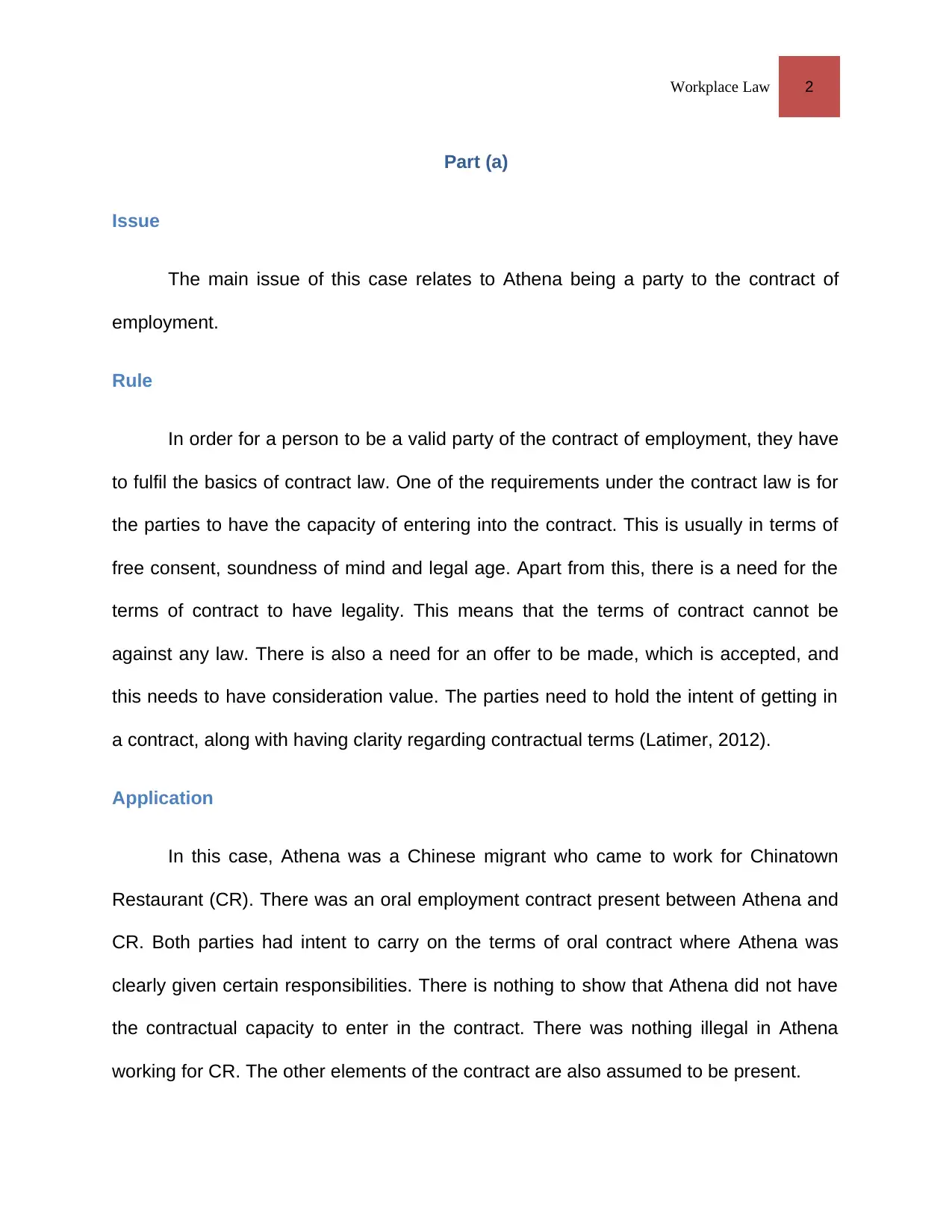
Workplace Law 2
Part (a)
Issue
The main issue of this case relates to Athena being a party to the contract of
employment.
Rule
In order for a person to be a valid party of the contract of employment, they have
to fulfil the basics of contract law. One of the requirements under the contract law is for
the parties to have the capacity of entering into the contract. This is usually in terms of
free consent, soundness of mind and legal age. Apart from this, there is a need for the
terms of contract to have legality. This means that the terms of contract cannot be
against any law. There is also a need for an offer to be made, which is accepted, and
this needs to have consideration value. The parties need to hold the intent of getting in
a contract, along with having clarity regarding contractual terms (Latimer, 2012).
Application
In this case, Athena was a Chinese migrant who came to work for Chinatown
Restaurant (CR). There was an oral employment contract present between Athena and
CR. Both parties had intent to carry on the terms of oral contract where Athena was
clearly given certain responsibilities. There is nothing to show that Athena did not have
the contractual capacity to enter in the contract. There was nothing illegal in Athena
working for CR. The other elements of the contract are also assumed to be present.
Part (a)
Issue
The main issue of this case relates to Athena being a party to the contract of
employment.
Rule
In order for a person to be a valid party of the contract of employment, they have
to fulfil the basics of contract law. One of the requirements under the contract law is for
the parties to have the capacity of entering into the contract. This is usually in terms of
free consent, soundness of mind and legal age. Apart from this, there is a need for the
terms of contract to have legality. This means that the terms of contract cannot be
against any law. There is also a need for an offer to be made, which is accepted, and
this needs to have consideration value. The parties need to hold the intent of getting in
a contract, along with having clarity regarding contractual terms (Latimer, 2012).
Application
In this case, Athena was a Chinese migrant who came to work for Chinatown
Restaurant (CR). There was an oral employment contract present between Athena and
CR. Both parties had intent to carry on the terms of oral contract where Athena was
clearly given certain responsibilities. There is nothing to show that Athena did not have
the contractual capacity to enter in the contract. There was nothing illegal in Athena
working for CR. The other elements of the contract are also assumed to be present.
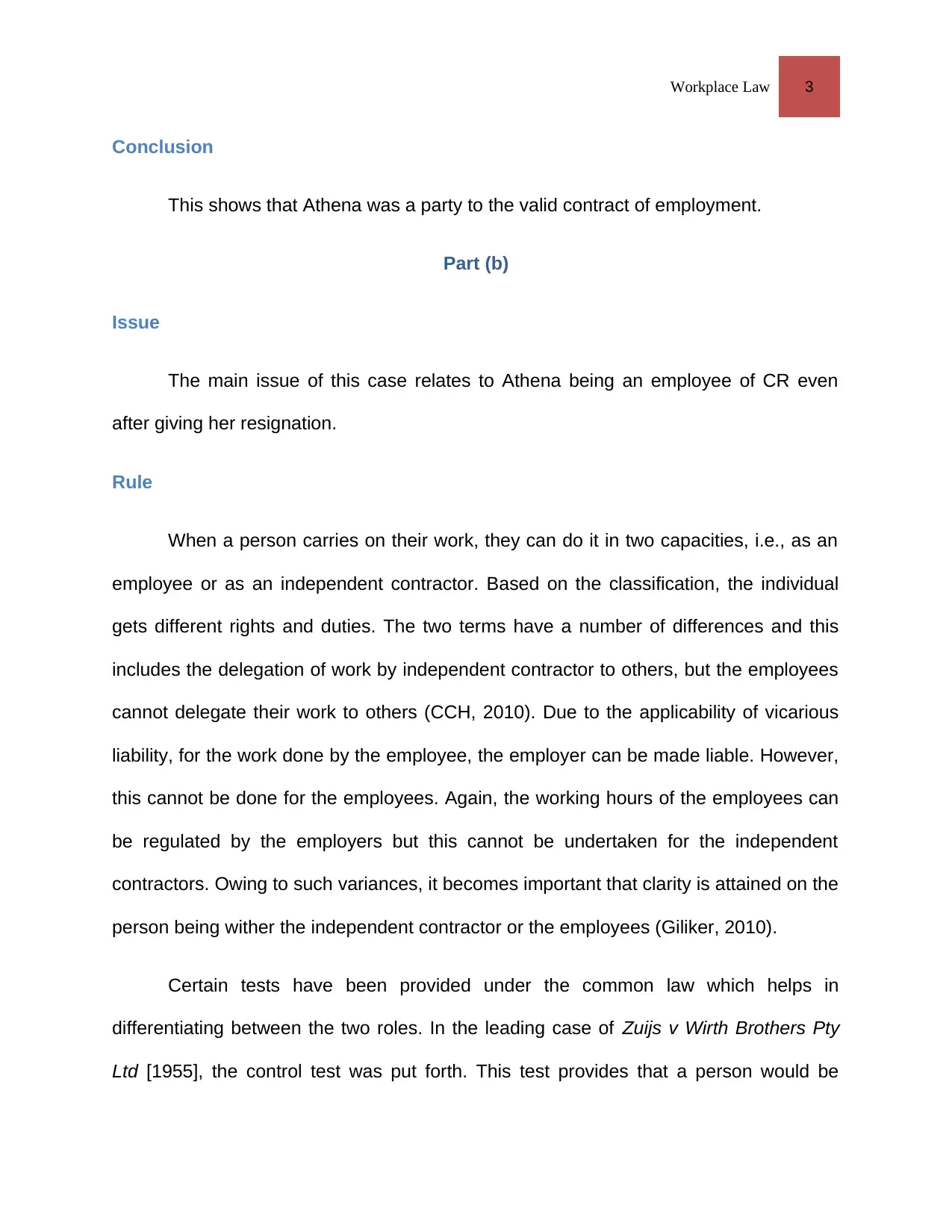
Workplace Law 3
Conclusion
This shows that Athena was a party to the valid contract of employment.
Part (b)
Issue
The main issue of this case relates to Athena being an employee of CR even
after giving her resignation.
Rule
When a person carries on their work, they can do it in two capacities, i.e., as an
employee or as an independent contractor. Based on the classification, the individual
gets different rights and duties. The two terms have a number of differences and this
includes the delegation of work by independent contractor to others, but the employees
cannot delegate their work to others (CCH, 2010). Due to the applicability of vicarious
liability, for the work done by the employee, the employer can be made liable. However,
this cannot be done for the employees. Again, the working hours of the employees can
be regulated by the employers but this cannot be undertaken for the independent
contractors. Owing to such variances, it becomes important that clarity is attained on the
person being wither the independent contractor or the employees (Giliker, 2010).
Certain tests have been provided under the common law which helps in
differentiating between the two roles. In the leading case of Zuijs v Wirth Brothers Pty
Ltd [1955], the control test was put forth. This test provides that a person would be
Conclusion
This shows that Athena was a party to the valid contract of employment.
Part (b)
Issue
The main issue of this case relates to Athena being an employee of CR even
after giving her resignation.
Rule
When a person carries on their work, they can do it in two capacities, i.e., as an
employee or as an independent contractor. Based on the classification, the individual
gets different rights and duties. The two terms have a number of differences and this
includes the delegation of work by independent contractor to others, but the employees
cannot delegate their work to others (CCH, 2010). Due to the applicability of vicarious
liability, for the work done by the employee, the employer can be made liable. However,
this cannot be done for the employees. Again, the working hours of the employees can
be regulated by the employers but this cannot be undertaken for the independent
contractors. Owing to such variances, it becomes important that clarity is attained on the
person being wither the independent contractor or the employees (Giliker, 2010).
Certain tests have been provided under the common law which helps in
differentiating between the two roles. In the leading case of Zuijs v Wirth Brothers Pty
Ltd [1955], the control test was put forth. This test provides that a person would be
⊘ This is a preview!⊘
Do you want full access?
Subscribe today to unlock all pages.

Trusted by 1+ million students worldwide
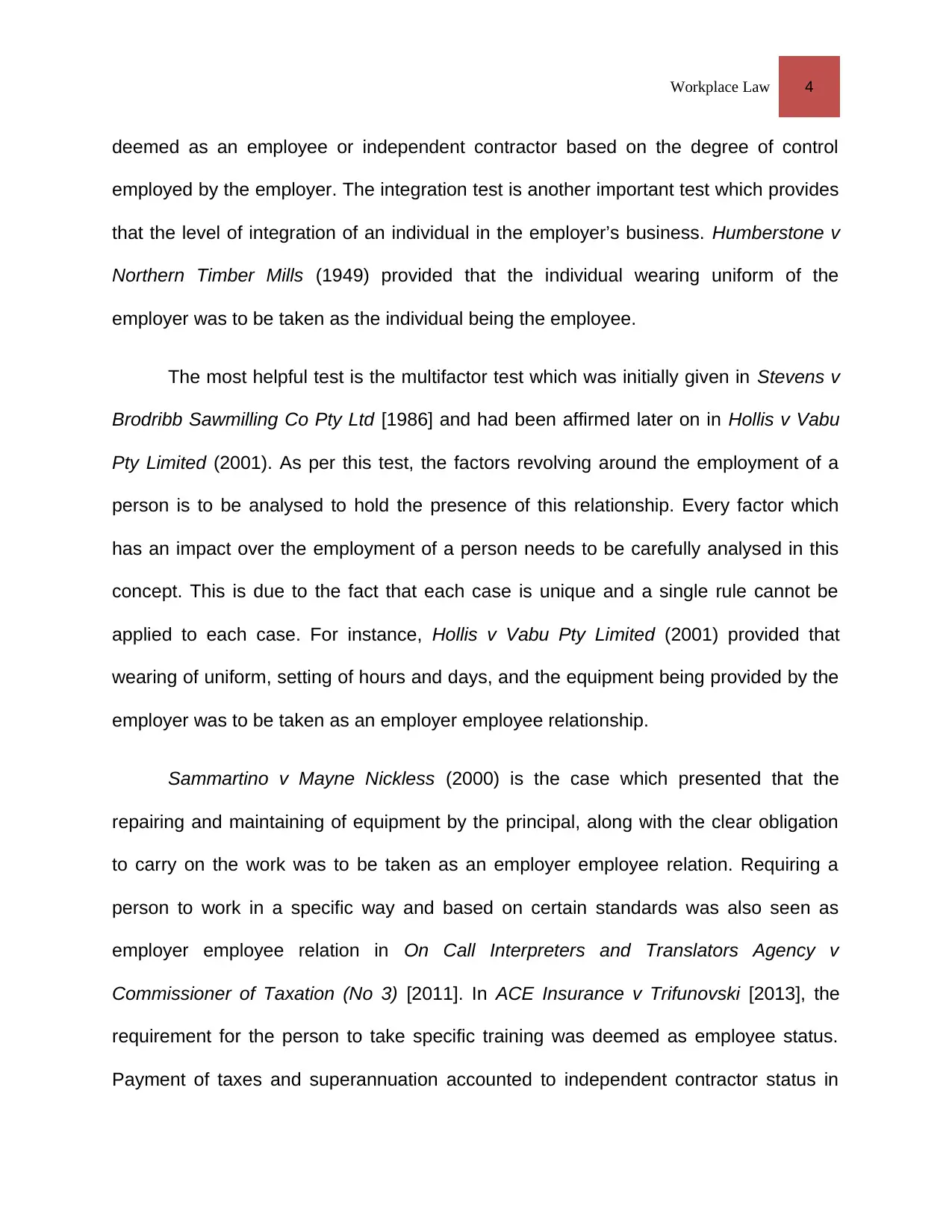
Workplace Law 4
deemed as an employee or independent contractor based on the degree of control
employed by the employer. The integration test is another important test which provides
that the level of integration of an individual in the employer’s business. Humberstone v
Northern Timber Mills (1949) provided that the individual wearing uniform of the
employer was to be taken as the individual being the employee.
The most helpful test is the multifactor test which was initially given in Stevens v
Brodribb Sawmilling Co Pty Ltd [1986] and had been affirmed later on in Hollis v Vabu
Pty Limited (2001). As per this test, the factors revolving around the employment of a
person is to be analysed to hold the presence of this relationship. Every factor which
has an impact over the employment of a person needs to be carefully analysed in this
concept. This is due to the fact that each case is unique and a single rule cannot be
applied to each case. For instance, Hollis v Vabu Pty Limited (2001) provided that
wearing of uniform, setting of hours and days, and the equipment being provided by the
employer was to be taken as an employer employee relationship.
Sammartino v Mayne Nickless (2000) is the case which presented that the
repairing and maintaining of equipment by the principal, along with the clear obligation
to carry on the work was to be taken as an employer employee relation. Requiring a
person to work in a specific way and based on certain standards was also seen as
employer employee relation in On Call Interpreters and Translators Agency v
Commissioner of Taxation (No 3) [2011]. In ACE Insurance v Trifunovski [2013], the
requirement for the person to take specific training was deemed as employee status.
Payment of taxes and superannuation accounted to independent contractor status in
deemed as an employee or independent contractor based on the degree of control
employed by the employer. The integration test is another important test which provides
that the level of integration of an individual in the employer’s business. Humberstone v
Northern Timber Mills (1949) provided that the individual wearing uniform of the
employer was to be taken as the individual being the employee.
The most helpful test is the multifactor test which was initially given in Stevens v
Brodribb Sawmilling Co Pty Ltd [1986] and had been affirmed later on in Hollis v Vabu
Pty Limited (2001). As per this test, the factors revolving around the employment of a
person is to be analysed to hold the presence of this relationship. Every factor which
has an impact over the employment of a person needs to be carefully analysed in this
concept. This is due to the fact that each case is unique and a single rule cannot be
applied to each case. For instance, Hollis v Vabu Pty Limited (2001) provided that
wearing of uniform, setting of hours and days, and the equipment being provided by the
employer was to be taken as an employer employee relationship.
Sammartino v Mayne Nickless (2000) is the case which presented that the
repairing and maintaining of equipment by the principal, along with the clear obligation
to carry on the work was to be taken as an employer employee relation. Requiring a
person to work in a specific way and based on certain standards was also seen as
employer employee relation in On Call Interpreters and Translators Agency v
Commissioner of Taxation (No 3) [2011]. In ACE Insurance v Trifunovski [2013], the
requirement for the person to take specific training was deemed as employee status.
Payment of taxes and superannuation accounted to independent contractor status in
Paraphrase This Document
Need a fresh take? Get an instant paraphrase of this document with our AI Paraphraser
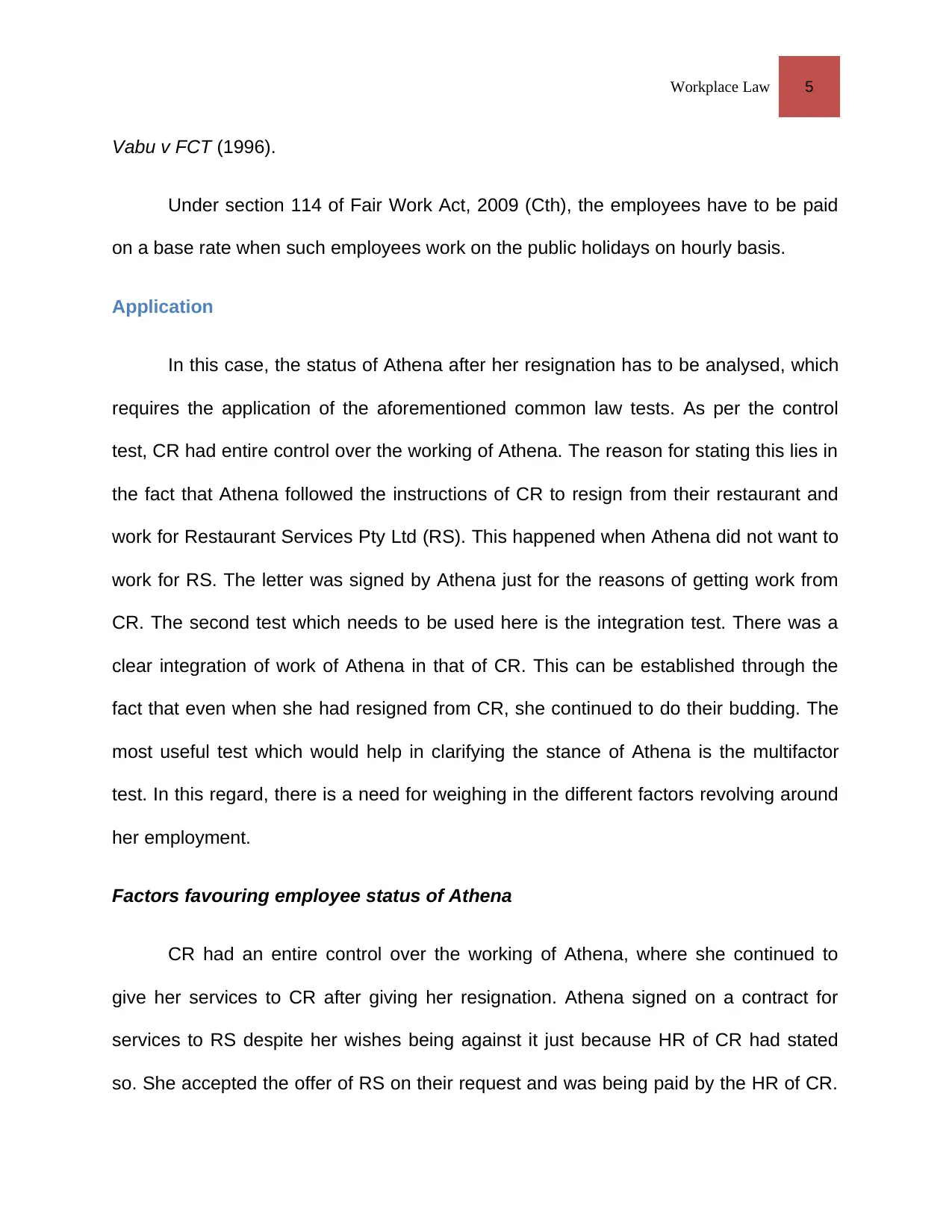
Workplace Law 5
Vabu v FCT (1996).
Under section 114 of Fair Work Act, 2009 (Cth), the employees have to be paid
on a base rate when such employees work on the public holidays on hourly basis.
Application
In this case, the status of Athena after her resignation has to be analysed, which
requires the application of the aforementioned common law tests. As per the control
test, CR had entire control over the working of Athena. The reason for stating this lies in
the fact that Athena followed the instructions of CR to resign from their restaurant and
work for Restaurant Services Pty Ltd (RS). This happened when Athena did not want to
work for RS. The letter was signed by Athena just for the reasons of getting work from
CR. The second test which needs to be used here is the integration test. There was a
clear integration of work of Athena in that of CR. This can be established through the
fact that even when she had resigned from CR, she continued to do their budding. The
most useful test which would help in clarifying the stance of Athena is the multifactor
test. In this regard, there is a need for weighing in the different factors revolving around
her employment.
Factors favouring employee status of Athena
CR had an entire control over the working of Athena, where she continued to
give her services to CR after giving her resignation. Athena signed on a contract for
services to RS despite her wishes being against it just because HR of CR had stated
so. She accepted the offer of RS on their request and was being paid by the HR of CR.
Vabu v FCT (1996).
Under section 114 of Fair Work Act, 2009 (Cth), the employees have to be paid
on a base rate when such employees work on the public holidays on hourly basis.
Application
In this case, the status of Athena after her resignation has to be analysed, which
requires the application of the aforementioned common law tests. As per the control
test, CR had entire control over the working of Athena. The reason for stating this lies in
the fact that Athena followed the instructions of CR to resign from their restaurant and
work for Restaurant Services Pty Ltd (RS). This happened when Athena did not want to
work for RS. The letter was signed by Athena just for the reasons of getting work from
CR. The second test which needs to be used here is the integration test. There was a
clear integration of work of Athena in that of CR. This can be established through the
fact that even when she had resigned from CR, she continued to do their budding. The
most useful test which would help in clarifying the stance of Athena is the multifactor
test. In this regard, there is a need for weighing in the different factors revolving around
her employment.
Factors favouring employee status of Athena
CR had an entire control over the working of Athena, where she continued to
give her services to CR after giving her resignation. Athena signed on a contract for
services to RS despite her wishes being against it just because HR of CR had stated
so. She accepted the offer of RS on their request and was being paid by the HR of CR.
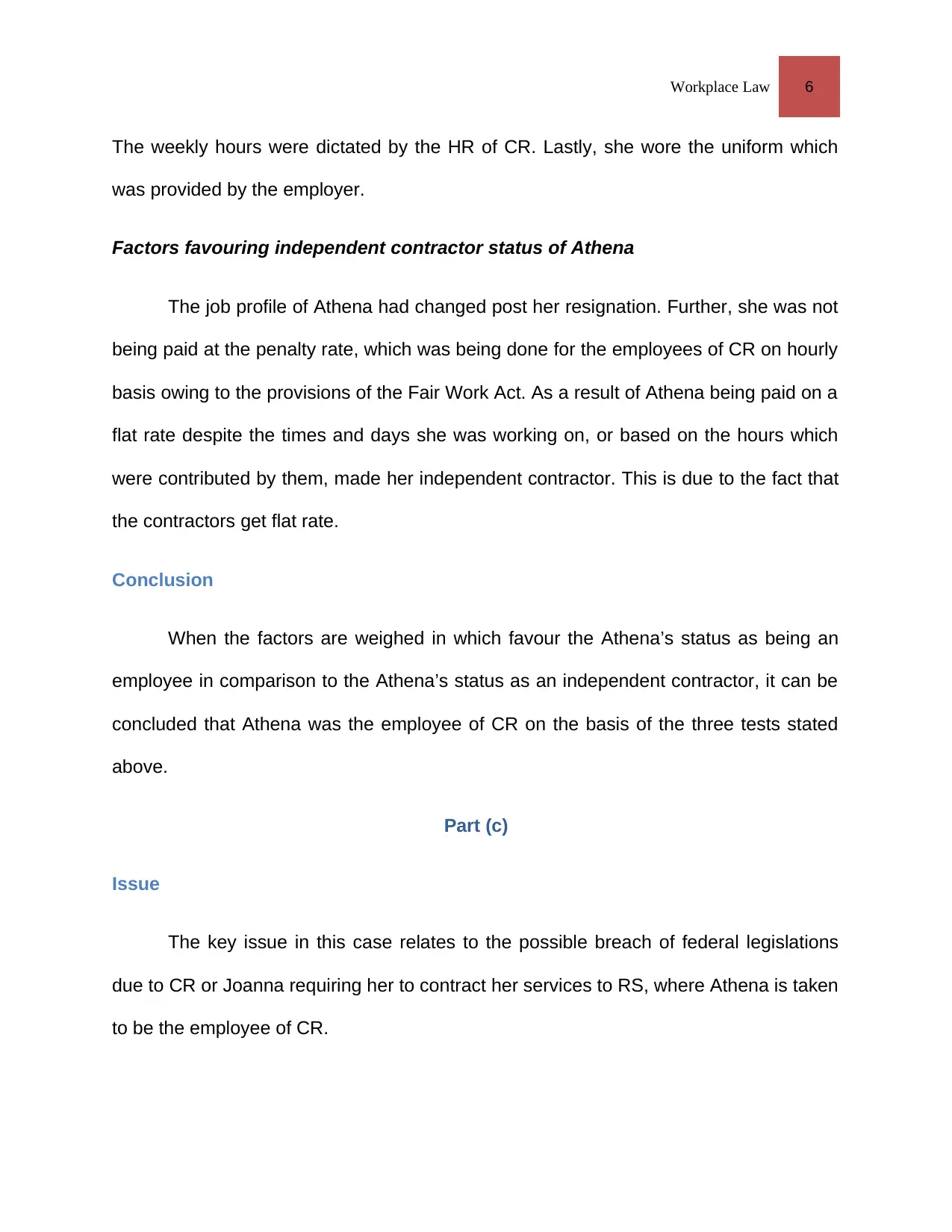
Workplace Law 6
The weekly hours were dictated by the HR of CR. Lastly, she wore the uniform which
was provided by the employer.
Factors favouring independent contractor status of Athena
The job profile of Athena had changed post her resignation. Further, she was not
being paid at the penalty rate, which was being done for the employees of CR on hourly
basis owing to the provisions of the Fair Work Act. As a result of Athena being paid on a
flat rate despite the times and days she was working on, or based on the hours which
were contributed by them, made her independent contractor. This is due to the fact that
the contractors get flat rate.
Conclusion
When the factors are weighed in which favour the Athena’s status as being an
employee in comparison to the Athena’s status as an independent contractor, it can be
concluded that Athena was the employee of CR on the basis of the three tests stated
above.
Part (c)
Issue
The key issue in this case relates to the possible breach of federal legislations
due to CR or Joanna requiring her to contract her services to RS, where Athena is taken
to be the employee of CR.
The weekly hours were dictated by the HR of CR. Lastly, she wore the uniform which
was provided by the employer.
Factors favouring independent contractor status of Athena
The job profile of Athena had changed post her resignation. Further, she was not
being paid at the penalty rate, which was being done for the employees of CR on hourly
basis owing to the provisions of the Fair Work Act. As a result of Athena being paid on a
flat rate despite the times and days she was working on, or based on the hours which
were contributed by them, made her independent contractor. This is due to the fact that
the contractors get flat rate.
Conclusion
When the factors are weighed in which favour the Athena’s status as being an
employee in comparison to the Athena’s status as an independent contractor, it can be
concluded that Athena was the employee of CR on the basis of the three tests stated
above.
Part (c)
Issue
The key issue in this case relates to the possible breach of federal legislations
due to CR or Joanna requiring her to contract her services to RS, where Athena is taken
to be the employee of CR.
⊘ This is a preview!⊘
Do you want full access?
Subscribe today to unlock all pages.

Trusted by 1+ million students worldwide
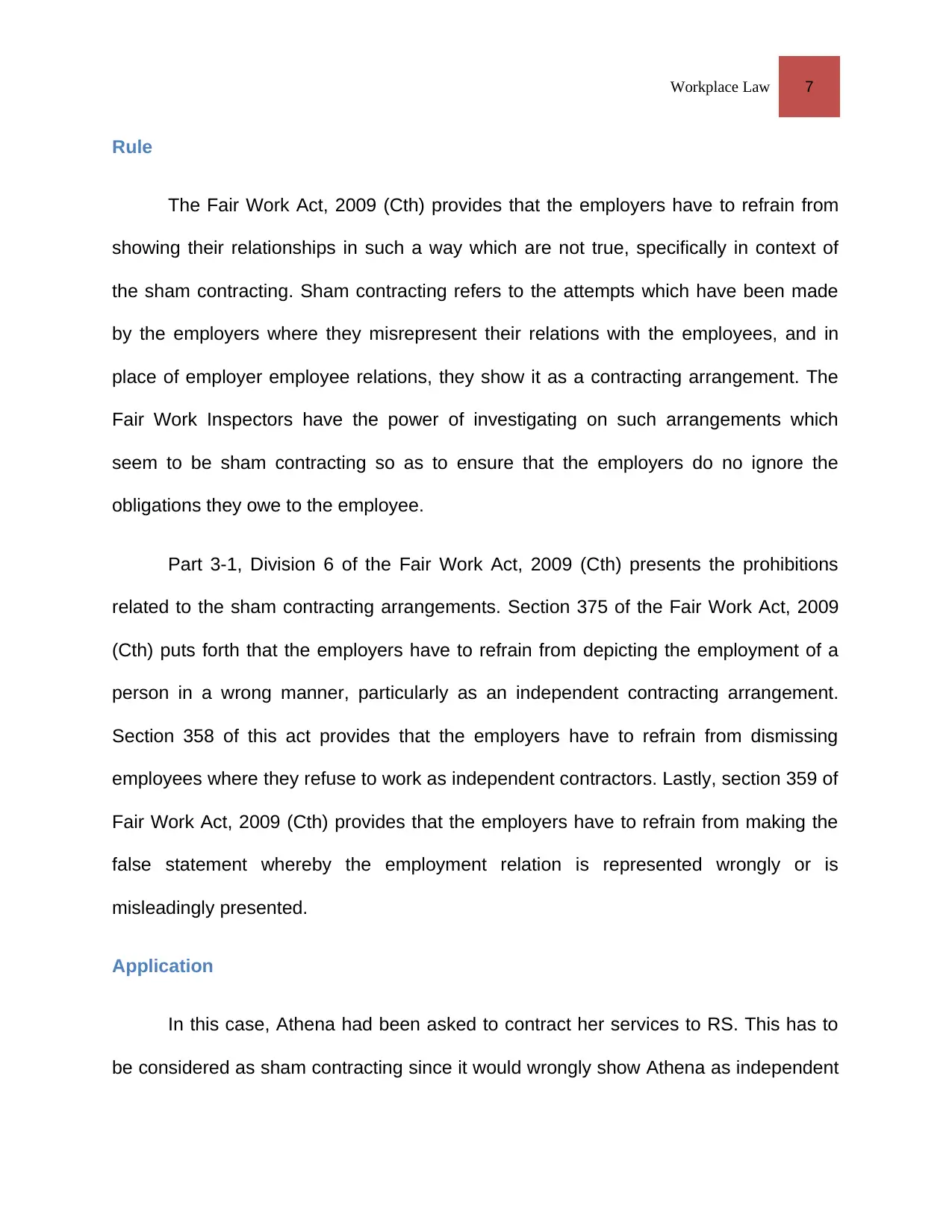
Workplace Law 7
Rule
The Fair Work Act, 2009 (Cth) provides that the employers have to refrain from
showing their relationships in such a way which are not true, specifically in context of
the sham contracting. Sham contracting refers to the attempts which have been made
by the employers where they misrepresent their relations with the employees, and in
place of employer employee relations, they show it as a contracting arrangement. The
Fair Work Inspectors have the power of investigating on such arrangements which
seem to be sham contracting so as to ensure that the employers do no ignore the
obligations they owe to the employee.
Part 3-1, Division 6 of the Fair Work Act, 2009 (Cth) presents the prohibitions
related to the sham contracting arrangements. Section 375 of the Fair Work Act, 2009
(Cth) puts forth that the employers have to refrain from depicting the employment of a
person in a wrong manner, particularly as an independent contracting arrangement.
Section 358 of this act provides that the employers have to refrain from dismissing
employees where they refuse to work as independent contractors. Lastly, section 359 of
Fair Work Act, 2009 (Cth) provides that the employers have to refrain from making the
false statement whereby the employment relation is represented wrongly or is
misleadingly presented.
Application
In this case, Athena had been asked to contract her services to RS. This has to
be considered as sham contracting since it would wrongly show Athena as independent
Rule
The Fair Work Act, 2009 (Cth) provides that the employers have to refrain from
showing their relationships in such a way which are not true, specifically in context of
the sham contracting. Sham contracting refers to the attempts which have been made
by the employers where they misrepresent their relations with the employees, and in
place of employer employee relations, they show it as a contracting arrangement. The
Fair Work Inspectors have the power of investigating on such arrangements which
seem to be sham contracting so as to ensure that the employers do no ignore the
obligations they owe to the employee.
Part 3-1, Division 6 of the Fair Work Act, 2009 (Cth) presents the prohibitions
related to the sham contracting arrangements. Section 375 of the Fair Work Act, 2009
(Cth) puts forth that the employers have to refrain from depicting the employment of a
person in a wrong manner, particularly as an independent contracting arrangement.
Section 358 of this act provides that the employers have to refrain from dismissing
employees where they refuse to work as independent contractors. Lastly, section 359 of
Fair Work Act, 2009 (Cth) provides that the employers have to refrain from making the
false statement whereby the employment relation is represented wrongly or is
misleadingly presented.
Application
In this case, Athena had been asked to contract her services to RS. This has to
be considered as sham contracting since it would wrongly show Athena as independent
Paraphrase This Document
Need a fresh take? Get an instant paraphrase of this document with our AI Paraphraser
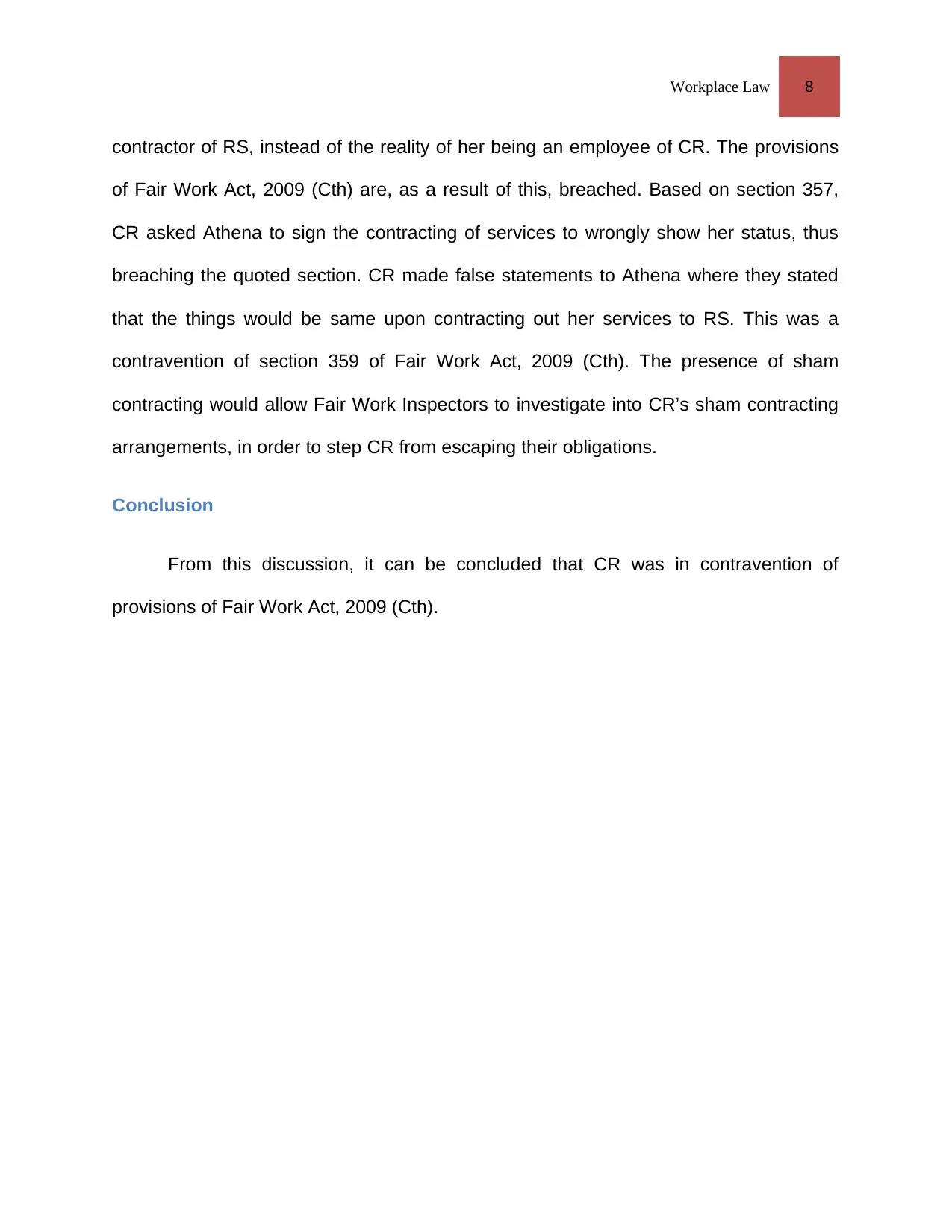
Workplace Law 8
contractor of RS, instead of the reality of her being an employee of CR. The provisions
of Fair Work Act, 2009 (Cth) are, as a result of this, breached. Based on section 357,
CR asked Athena to sign the contracting of services to wrongly show her status, thus
breaching the quoted section. CR made false statements to Athena where they stated
that the things would be same upon contracting out her services to RS. This was a
contravention of section 359 of Fair Work Act, 2009 (Cth). The presence of sham
contracting would allow Fair Work Inspectors to investigate into CR’s sham contracting
arrangements, in order to step CR from escaping their obligations.
Conclusion
From this discussion, it can be concluded that CR was in contravention of
provisions of Fair Work Act, 2009 (Cth).
contractor of RS, instead of the reality of her being an employee of CR. The provisions
of Fair Work Act, 2009 (Cth) are, as a result of this, breached. Based on section 357,
CR asked Athena to sign the contracting of services to wrongly show her status, thus
breaching the quoted section. CR made false statements to Athena where they stated
that the things would be same upon contracting out her services to RS. This was a
contravention of section 359 of Fair Work Act, 2009 (Cth). The presence of sham
contracting would allow Fair Work Inspectors to investigate into CR’s sham contracting
arrangements, in order to step CR from escaping their obligations.
Conclusion
From this discussion, it can be concluded that CR was in contravention of
provisions of Fair Work Act, 2009 (Cth).
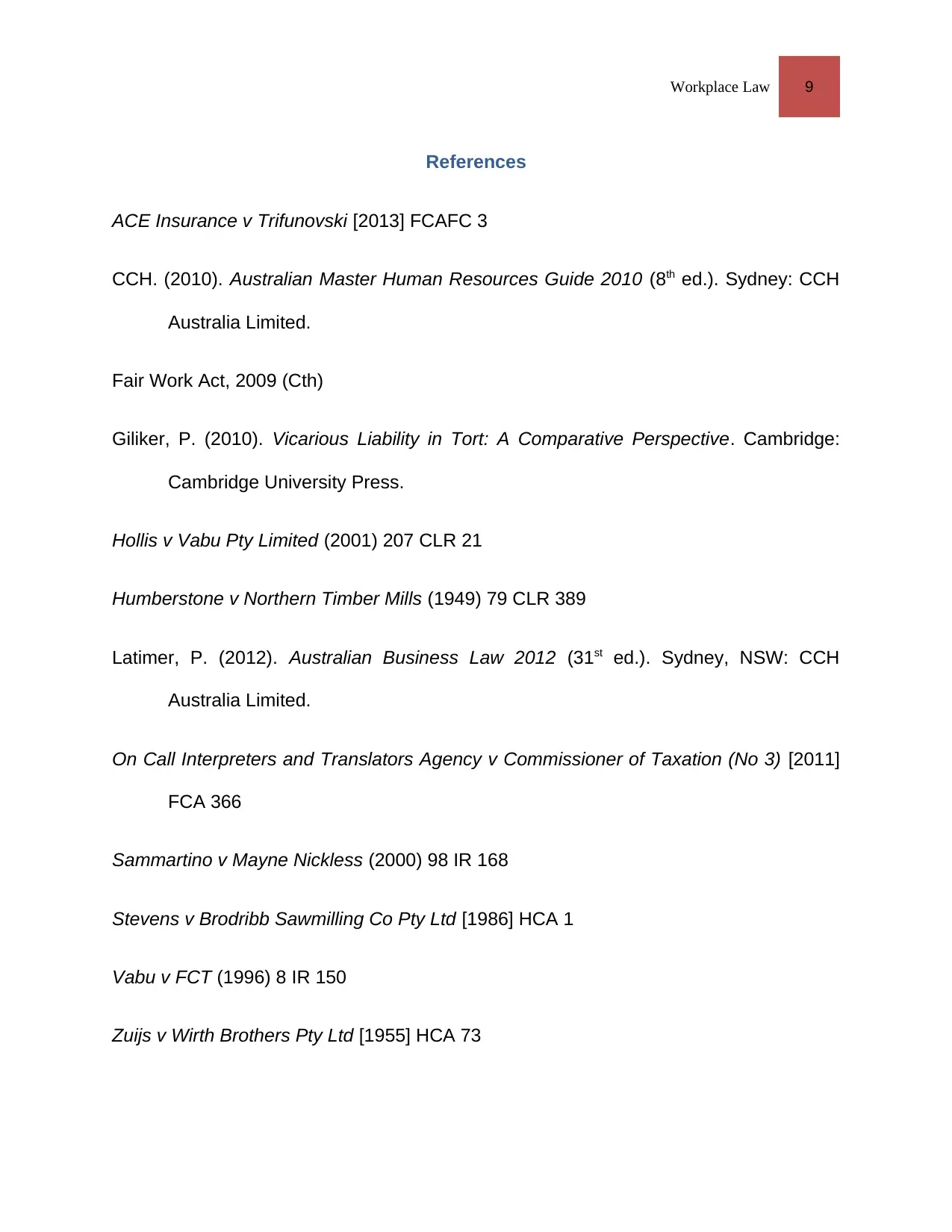
Workplace Law 9
References
ACE Insurance v Trifunovski [2013] FCAFC 3
CCH. (2010). Australian Master Human Resources Guide 2010 (8th ed.). Sydney: CCH
Australia Limited.
Fair Work Act, 2009 (Cth)
Giliker, P. (2010). Vicarious Liability in Tort: A Comparative Perspective. Cambridge:
Cambridge University Press.
Hollis v Vabu Pty Limited (2001) 207 CLR 21
Humberstone v Northern Timber Mills (1949) 79 CLR 389
Latimer, P. (2012). Australian Business Law 2012 (31st ed.). Sydney, NSW: CCH
Australia Limited.
On Call Interpreters and Translators Agency v Commissioner of Taxation (No 3) [2011]
FCA 366
Sammartino v Mayne Nickless (2000) 98 IR 168
Stevens v Brodribb Sawmilling Co Pty Ltd [1986] HCA 1
Vabu v FCT (1996) 8 IR 150
Zuijs v Wirth Brothers Pty Ltd [1955] HCA 73
References
ACE Insurance v Trifunovski [2013] FCAFC 3
CCH. (2010). Australian Master Human Resources Guide 2010 (8th ed.). Sydney: CCH
Australia Limited.
Fair Work Act, 2009 (Cth)
Giliker, P. (2010). Vicarious Liability in Tort: A Comparative Perspective. Cambridge:
Cambridge University Press.
Hollis v Vabu Pty Limited (2001) 207 CLR 21
Humberstone v Northern Timber Mills (1949) 79 CLR 389
Latimer, P. (2012). Australian Business Law 2012 (31st ed.). Sydney, NSW: CCH
Australia Limited.
On Call Interpreters and Translators Agency v Commissioner of Taxation (No 3) [2011]
FCA 366
Sammartino v Mayne Nickless (2000) 98 IR 168
Stevens v Brodribb Sawmilling Co Pty Ltd [1986] HCA 1
Vabu v FCT (1996) 8 IR 150
Zuijs v Wirth Brothers Pty Ltd [1955] HCA 73
⊘ This is a preview!⊘
Do you want full access?
Subscribe today to unlock all pages.

Trusted by 1+ million students worldwide
1 out of 9
Related Documents
Your All-in-One AI-Powered Toolkit for Academic Success.
+13062052269
info@desklib.com
Available 24*7 on WhatsApp / Email
![[object Object]](/_next/static/media/star-bottom.7253800d.svg)
Unlock your academic potential
Copyright © 2020–2026 A2Z Services. All Rights Reserved. Developed and managed by ZUCOL.





